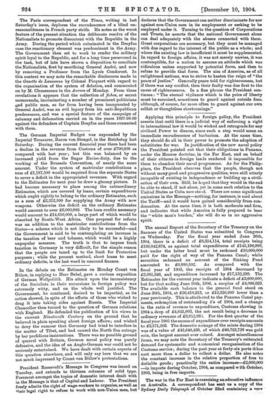Applying this principle to foreign policy, the President asserts that
until there is a judicial way of enforcing a right in international law it would be wicked and retrograde for any civilised Power to disarm, since such a step would mean an immediate recrudescence of barbarism. At the same time, they should do all in their power to promote the adoption of substitutes for war. In justification of the new naval policy the President pointed out that their obligations in Panama, under the Monroe doctrine, in the Far East, and on behalf of their citizens in foreign lands rendered it impossible for them to abandon their naval programme. As for the Philip- pines, the President observes that the people, though not without many good and progressive qualities, were still utterly incapable of existing in independence or building up a civili- sation of their own. Still, be hoped that they would in the end be able to stand, if not alone, yet in some such relation to the United States as Cuba now stood. There are some significant omissions in the Message—nothing, for instance, is said about the Tariff—and it would have gained considerably from con- densation. At the same time, it is both moderate and firm, and indicates that while America is fully prepared to bear the "white man's burden," she will do so in no aggressive spirit.






























































 Previous page
Previous page